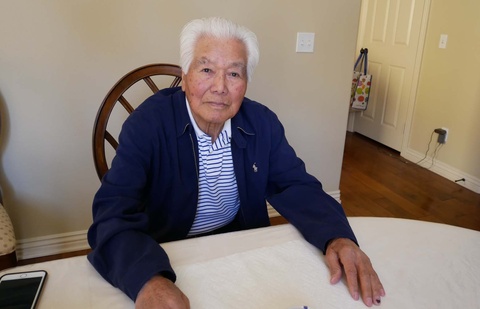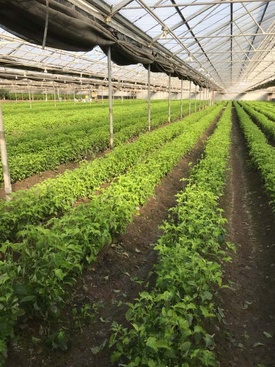
Returned to the U.S. after a short period of agricultural labor
So far, we have interviewed the owners of farms that grow Japanese vegetables in America, but this time we will introduce Nagatoshi, who runs the vast Nagatoshi Farm in Oxnard, California, and also owns Nagatoshi Produce, a vegetable and fruit wholesaler. Nagatoshi was born in Fukuoka Prefecture in 1939. At the age of 21, he came to California on a three-year temporary agricultural labor visa.
While he was working on farm work at a farm in Oxnard as part of his training, he says he was always thinking about what he would do if he were a farm manager. "I was the eighth of nine children. I didn't belong in Japan. I didn't like being employed by others, so my goal was to run a farm overseas. I wanted to move to the US or South America, so for the first three years I didn't feel like the work was hard or difficult. I just wanted to absorb and learn about farm management."
At the time, one dollar was worth 360 yen. "When I worked in Japan, my daily wage was 300 yen. But when I came to America, I was paid one dollar per hour. I worked 12 to 13 hours a day, six days a week, sometimes seven days a week. Over three years, I saved up 5,000 dollars. I didn't want to waste it, so I didn't spend it. That's 1.8 million yen in Japanese yen. In those days, you could build a house with 1 million yen in Japan." Although he saved up money, he was in an 18-person room with absolutely no privacy.
After completing his three-year training period, he met people returning from South America on the ship returning to Japan. Hearing from them that South America was far behind America, Nagatoshi decided to emigrate to America. He returned to America in 1964 and worked as a gardener for a year. "At a time when an average businessman was earning $500 a month, I was earning $2,000 a month as a gardener. But I quit after a year because, as a Japanese man, I just couldn't accept being told what to do by a woman." Sixty years ago, in America, housewives, who were his customers, were already giving instructions to gardeners. Thus, Nagatoshi quit his high-paying job as a gardener, rented four acres of land in Oxnard, and embarked on his original goal of running a farm.
"At that time, there were 60 farms run by Japanese people in Oxnard. Most of them are gone now. I started but I had no money, no experience and no credibility. It took about six years to get on track. I wanted to give up many times. But I didn't want people to say that I'd 'gone bankrupt,' so I kept telling myself to try one more day, to give it just one more day, and that's what got me to where I am today. A major turning point came when, at first, I only grew vegetables for white people, but in 1981 I started growing Japanese vegetables. Furthermore, after I opened the wholesale business Nagatoshi Produce, I no longer had to worry about money. Even now, there are 30 employees at the farm and 30 at Produce."
Japanese vegetable growing and Japanese food boom

Then, about 40 years ago, when Nagatoshi switched to Japanese vegetables, the Japanese food boom hit America. "At the time, our Tokyo leeks and turnips began to be sold at Japanese food markets like New Meiji and Modern Food. Nagatoshi's green-necked daikon radishes were praised as the best in the world, and we also started selling radishes." Demand for Japanese vegetables increased not only in Japanese food markets, but also in the growing number of Japanese restaurants across America. Currently, Produce sells all kinds of Japanese vegetables, but the main crop at the farm is shiso leaves.
The successor is his eldest son, Seth. Nagatoshi says, "My son is passionate about sports, winning surfing championships and devoting himself to golf, and didn't seem interested in farming, but he ended up taking over the family business. He goes to work at the farm in Los Angeles during the week and goes to the farm in Oxnard on Saturdays." Nagatoshi's wife, Hisako, also continues to support the farm, taking care of the accounting.
Looking back on his nearly 60 years of farm management, Nagatoshi says with a smile, "I have no regrets in my life." "I've always put my all into every moment. If you've done your best, you won't say things like, "I wish I had done this at that time." If the results are bad, it's just because I didn't have the ability. I've never been the type of person who likes to blame others. As the manager, I make the decisions. So the responsibility is always mine. I've always lived that way. No matter how hard life is in the middle, if it ends well, the hardships become a laughing matter."
When asked what was the hardest part, Nagatoshi replied that it was constantly being pressured to make payments. "Every day, various bills would arrive. But at the time I still had no money, so I would line them up on one page and prioritize which ones I would pay right away and which ones could wait." He recalled that he was so desperate to find money that his hair suddenly turned white. "My hair turned white three times. I thought that financial difficulties would continue for the rest of my life, but I was able to get through it with the help of the people who helped me."
Now in his 80s, it seems like he is nearing the time for retirement, but he says he is actually working on making his yuzu kosho, made with yuzu and chili peppers from his farm, a popular product in the U.S. It looks like he still has a long way to go before he retires.
Although I met Nagatoshi for the first time during this interview, he seemed like a familiar face to me. Perhaps it's because we're both from Kyushu. But more than that, Nagatoshi is the epitome of a good old-fashioned Japanese person who doesn't make excuses, works hard and produces results without compromising, something that's hard to find in Japan today. That's the reason I felt nostalgic.
© 2022 Keiko Fukuda





